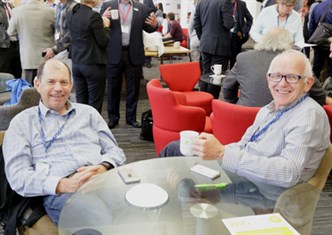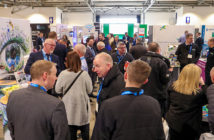There is no other event in the world that can match the International Conference on Urban Pests (ICUP) for its strength and depth of urban pest management expertise. Held every three years the 2017 event, which came to Birmingham, UK from 9 to 12 July, attracted some 250 pest management academics and service professionals from across the globe.
This was a truly international conference. Delegates and speakers came from as far away as Australia, Brazil, China, Colombia, India, Iran, Japan, Thailand, Saudi Arabia, Singapore, the Philippines and the USA, as well as from many European countries. The UK was well represented with the British numbers swelled on day two when a special one-day workshop for practical pest managers was held.
|
|
|
|
|
Insects and how to combat the threat they pose dominated the programme. The opening plenary session, introduced by Dr Matthew Davies, chair of the ICUP 2017 organising committee, included global issues such as climate change and the unintended consequences of regulation, as well as more local topics such as how the UK is detecting and dealing with invasive mosquito species and, from Japan, a paper on how artificial light from a new shopping centre is boosting massive flights of aquatic insects. Rodents and other vertebrate pests were not forgotten with nine sessions devoted to these, rather more than at previous ICUP conferences but, not enough according to some delegates, who felt that four footed pests were under represented – perhaps a function of the volume of research devoted to rodent and other vertebrate pests? Dr John Simmons, Acheta Consulting, UK, presented findings which clearly demonstrated how mice are deliberately avoiding trapping devices placed for monitoring purposes in food factories casting considerable doubt on their usefulness (as reported in Pest 39). His work indicated that the use of electronic monitoring systems that use rodent movement and body heat to trigger an alert can offer a more reliable alternative (as reported in Pest 39). There were sessions on ants, mosquitoes, termites and fleas, houseflies and a variety of museum pests. Non-chemical controls were also well represented, including the use of parasitic wasps to control museum pests. However, the one pest that is clearly attracting the most academic interest and, by implication the most research money, is bed bugs. As is common at these types of events there were a number of concurrent sessions meaning that, as a delegate you had to choose which papers to listen to. The first such decision had to be made around 15.30 on Monday 9 July and the choice was between bed bugs and invasive species. |
||
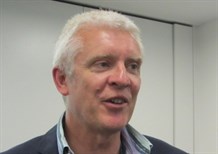 The UK’s Dr John Simmons from Acheta Consulting spoke about behavioural resistance in mice |
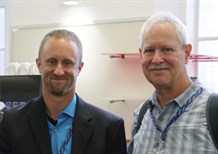 Bed Bug experts – Jeff White and Dr Mike Potter from the USA shared their expertise |
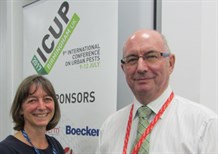 Workshop chair Dave Oldbury (right) with speaker Sandra Baker from Oxford University |
|
In the bed bug session, three eminent bed bug experts from the USA, Prof Dini Miller, Dr Mike Potter and Jeff White, presented interesting papers. Prof Miller’s research examined the impact of ‘clutter levels’ on heat treatments for bed bug control and concluded that these made little difference to the success of the treatment. The tactics used during the treatment such as heating the room quickly and then going in to shock the bugs by moving furniture, tipping up the bed etc along with the use of sensors to identify cold spots, were much more important. Dr Potter’s paper highlighted the fervent responses bed bugs provoke in most travellers. When booking accommodation online, a single report of a bed bug infestation (whether it was accurate or not) would cause the majority of travellers to choose another hotel. These set the tone for day two (Tuesday 10 July) when, if bed bugs were your thing, you could spend much of the day learning about recent bed bug research. Corraine and Seth McNeill from Union College, Lincoln, Nebraska reviewed their work on gender specific vision in bed bugs (as reported in Pest 46), and Dong-Hwan Choe from the University of California, Riverside detailed his work analysing the pheromones in shed bed bug skins (as reported in Pest 46). |
||||
 Husband and wife team – Corraine and Seth McNeill Husband and wife team – Corraine and Seth McNeill |
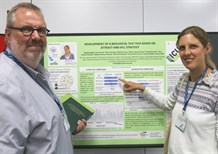 Karl-Heinz Lüpkes meets poster author Kerstin Büchel Karl-Heinz Lüpkes meets poster author Kerstin Büchel |
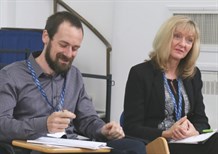 Chair (Dr Richard Naylor) with Prof Dini Miller in the bed bug workshop Chair (Dr Richard Naylor) with Prof Dini Miller in the bed bug workshop |
||
|
This was followed in the afternoon by the poster session. Rather than present papers, authors can produce a poster paper and then discuss it on a one-to-on basis with delegates. For the morning of Wednesday 12 July there was a break from bed bugs, but the conference returned to this subject on the final afternoon with an excellent workshop session. For this, delegates were split into two groups, those tending towards academia and those with a more practical calling. In much of the world data on the scale of bed bug infestation are simply non-existent so, with such an international gathering it was interesting to hear delegates’ opinions. The picture was far from uniform. Summarising the views expressed, Prof Moray Anderson and Dr Richard Naylor concluded that in many European countries, Norway, Sweden, Switzerland were specifically mentioned, the problem was thought to be growing, in others, such as the UK, the feeling was that levels had reached a plateau. In much of Asia bed bug infestation were widespread. Only Australia was thought to have got on top of the problem. |
||
|
|
|
|
| From an organisational point of view this was a generally excellent event. OK, the directional signing to the various rooms could have been better and those used to cooler temperatures found the lack of aircon in the bedrooms a handicap, as the British summer kicked in for two nights, until the rain came on Tuesday. Unfortunately, the rain coincided with the conference dinner at the Birmingham botanical gardens and rather limited the opportunities for horticultural exploration. The journey to the gardens via a red London bus was met with plenty of enthusiasm and, for those who joined in, the band went down very well. However, the casual format rather than a ‘sit down’ dinner, wasn’t to everyone’s taste and, whilst the quality of the food at the venue was good, the distribution was somewhat haphazard. For the conference itself however the refreshments included in the delegate fee – breakfast, lunch and snacks at the breaks – was both plentiful and excellent quality. | ||
|
|
|
|
|
Whilst the scientific presentations provide the focus of ICUP events, the discussions over coffee and lunch prove equally important with a global exchange of opinions and friendships struck. Another unique feature is that both printed and digital copies of all the papers are presented as proceedings at the start of the conference. The event was brought to a close by Dr Bill Robinson who, jointly with Clive Boase, has masterminded these events since their inception in1993. Bill announced that the tenth ICUP will be held in Spain at a similar time of the year in 2020. |
||

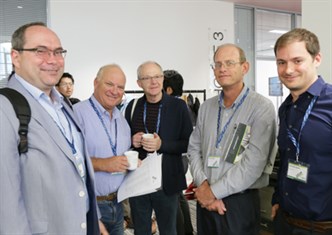
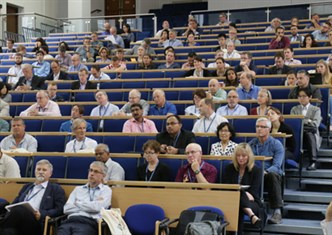 Delegates at the 9th ICUP event held in Birmingham – the third time it has been held in the UK since the
Delegates at the 9th ICUP event held in Birmingham – the third time it has been held in the UK since the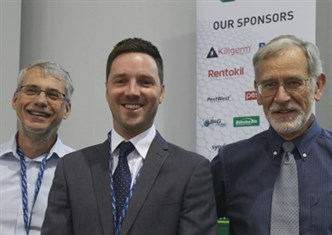 Chair of the 2017 Organising Committee, Dr Matthew Davies (centre), flanked by Executive Committee members – Clive Boase (left) and Bill Robinson
Chair of the 2017 Organising Committee, Dr Matthew Davies (centre), flanked by Executive Committee members – Clive Boase (left) and Bill Robinson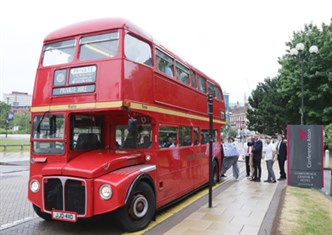 The London bus ride proved popular
The London bus ride proved popular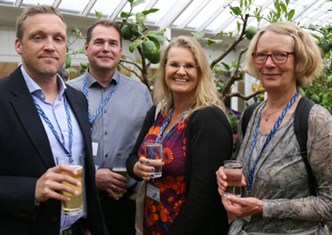 Delegates enjoying the botanical gardens
Delegates enjoying the botanical gardens